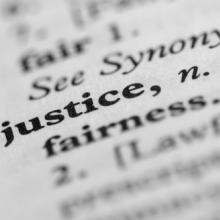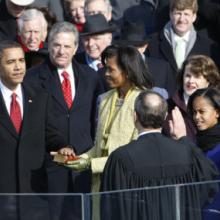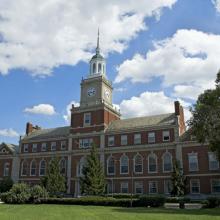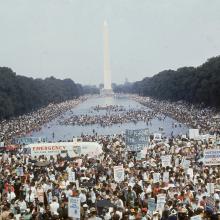martin luther king jr
We’ve spent the last few days recalling the anniversary of the March on Washington and listening again to the Rev. Martin Luther King, Jr., talk so powerfully about his dream of a land that is full of love and free of hatred. Stirring words. Inspiring words. Spirit-infused words. We’re also reminded that they’re only words until they produce action.
It’s one thing to be inspired when we hear something, another thing to respond to the inspiration and to do something.
Powerful words play a big role in our lives, challenging us and leading us. God is love. Love one another. Be compassionate. Love your enemies. Whatsoever you do to the least. Your brother‘s keeper. An instrument of your peace. Give to all. The moral arc of the universe is long, but it bends toward justice. Blessed are the poor. All men are created equal. The common good. Government of, by and for the people. I have a dream. Be the change. Make justice a reality for all God‘s children.
Those and so many other words inspire us to raise our lives and our world to new heights. But they remain words until we commit ourselves to live them. Then they acquire real power.
Even with the scores of marches on Washington since 1963, we all still know what we mean when we say the March on Washington.
In our collective memory, we see black-and-white images of immaculately dressed men and women wearing hats, ties, and dresses, marching in dress shoes. We see a sea of people stretching from the Lincoln Memorial to the Washington Monument. And we see Dr. Martin Luther King, Jr., frozen in time, smiling and waving to the crowd of a quarter million people. We see King’s passion, mouth open as he bellows words that sear the conscience of a nation and ignite its imagination. His arm is outstretched over the podium. He is surrounded by men and women who are also there to plead with a nation to “let freedom ring!”
These images are seared into our nation’s memory, even though most of us were not there.
This year marks the 150th anniversary of both the issuing of Emancipation Proclamation and the battle of Gettysburg. This month marks the 50th anniversary of the historic March on Washington and Dr. Martin Luther King, Jr.’s “I Have a Dream” speech. All three moments marked major turning points in the fundamental American struggle to actualize the divine dream of life, liberty, and equality for all. That dream has been especially powerful through the struggle for African-American freedom.
From a biblical perspective, American slavery and Jim Crow segregation not only subjugated the body. For about 300 years, from Virginia’s first race-based slave laws in the 1660s to the passage of the Voting Rights Act in 1965, the legal binding of black hands, feet, and mouths also bound spirits and souls. Both slavery and Jim Crow laws denied the dignity of human beings made in the image of God and forbade them from obeying God’s command to exercise Genesis 1:28 “dominion” — in today’s terms, human agency.
So, the Emancipation Proclamation and passage of the 13th, 14th, and 15th Amendments were cause for jubilee worship in black churches and among other abolitionists. Likewise when the Civil Rights Act passed in 1964 and the Voting Rights Act passed in 1965, churches across the nation erupted again in worshipful jubilee.
Now, nearly 50 years after the second American jubilee, African Americans are being stripped of dignity and constitutionally protected freedoms like we have not seen since Jim Crow.
Charles Carpenter
George Murray
Nolan Harmon
Paul Hardin
Joseph Durick
Earl Stallings
Edward Ramage
Milton Grafman
In towns all across America, streets are not named after them. School children do not learn about them. No one waits in line to see the homes where they were born. They are ... simply forgotten.
They weren’t necessarily bad men. They weren’t unimportant men. They were men of influence, men with a voice and the respect of their community. Most would have agreed; they were good men, according to one, “men of genuine good will.” While evil men are remembered and great men are enshrined, these men … just forgotten.
They are forgotten for being on the wrong side of history. Men forgotten for being silent when “a word fitly spoken” could have made a difference. Men who are forgotten for valuing comfort and stability over justice and compassion. Forgotten because they were unwilling to call out the status quo, and show it for it was … cruel and unjust.
These are the eight men on the other side of Martin Luther King’s “Letter from a Birmingham Jail.” The recipients. Eight well educated white pastors, priests, and rabbis who by God’s providence led reputable congregations in Birmingham, Ala., in 1963.
"The arc of the moral universe is long but it bends towards justice," proclaimed the Reverend Dr. Martin Luther King, Jr.
It may bend towards justice, but it does not bend gently. It bends behind sweat of the brow, creativity of the mind, and love from the soul of those who believe that every living soul not only desires justice and equality, but has a right to it. You see, justice is not a passive pursuit. The moral arc will not bend without encouragement.
Dr. King was a living example of the kind of person who encourages the moral arc of history to bend toward justice. He is also an example of the only effective way to bend that arc — non-violently. We cannot hope to bring about justice by unjust means. Might, physical confrontation, and other forms of domination will ultimately only result in nurturing an understanding that domination is an ineffective way to resolve issues of justice — and domination is the exact opposite of justice. As King says, "Hate begets hate; violence begets violence; toughness begets a greater toughness. We must meet the forces of hate with the power of love."
WASHINGTON — President Obama will take the oath of office with two Bibles that once belonged to a pair of civil rights icons: Abraham Lincoln and Martin Luther King Jr.
King’s “traveling Bible” was provided by his family, while the Lincoln Bible is from the Library of Congress and was used during the 16th president’s inauguration on March 4, 1861; Obama also used the Lincoln Bible during his first inauguration in 2009.
The Lincoln and King good books will be used during this year’s public swearing-in ceremony on Jan. 21, the Presidential Inaugural Committee announced. King’s Bible will be stacked atop Lincoln’s.
“President Obama is honored to use these Bibles at the swearing-in ceremonies,” said Steve Kerrigan, president and CEO of the inaugural committee. “These Bibles are rich in tradition and reflect the great American story that binds our nation.”
For many pundits and observers, last week’s election proved that a “new normal” has emerged in America: record numbers of women and ethnic minorities were voted into the House and the Senate, and the House will also see its first Hindu representative in January. Voters in Maine and Maryland approved same-sex marriage, and a diverse coalition of social minorities came together to re-elect the nation's first black president.
But for black theologians, the election has also been an occasion to reflect on how the black church faces an identity crisis, losing track of its mission to lead the way in issues of justice and liberation.
“Something happened to the black church after the assassination of Martin Luther King, Jr., in 1968,” said Dr. Gayraud Wilmore, one of the founders of black theology, adding that when King died, it seemed that in black congregations, the enthusiasm for black history and racial identity also died.
And for Wilmore, the last 44 years — even the election and re-election of a black president — have done little to abate this crisis.
I’VE ALWAYS LOOKED forward to Advent. It’s a time each year of expectant hope—the hope brought by the coming of a child, born in an animal stall in Bethlehem, who would change everything. It is the time of year when I am reminded again of the choice we always have between cynicism and hope. That’s ultimately a spiritual choice, and Advent is a formative season that nurtures the choice to hope, which can guide our decisions and actions.
This fall, Sojourners launched a new project called Emerging Voices, and it’s one of the most hopeful initiatives I have been involved with in a long time. It aims to mentor, develop, and promote the most dynamic up-and-coming communicators—speakers, preachers, and teachers—who are called to lead and publicly articulate the biblical call to social justice.
The vision for this project is exciting and something to be celebrated. It also calls to mind a critical observation: Our world often wants saviors, not prophets; new messiahs, not leaders. We want heroes with superhuman strength who save the day, not mere mortals who speak the truths we typically don’t want to hear. Even the modern-day giants of social justice—Dr. Martin Luther King Jr., Dorothy Day, and Mahatma Gandhi, for example—were at best prophets, but never saviors.
It’s easy to slip into the mentality that one person, one voice, will rise up in a generation, and that she or he will change the world as we know it. Dr. King spoke of this temptation as the “drum major instinct.” It is the basic desire of humans to lead the charge and, ultimately, reap the recognition—or, at the very least, to place our confidence in a single human being.
In early 1968, Martin Luther King, Jr., and other civil rights leaders continued plans for a Poor People’s Campaign. It would take place in the spring in Washington, D.C. The poor and those in solidarity with them would take up temporary residence and march peacefully on the Capitol and advocate for substantial anti-poverty legislation from Congress. They would demand jobs, healthcare, and decent housing.
People set up a camp on the Washington Mall and called it Resurrection City. Jesse Jackson gave his famous "I Am Somebody" speech there. But King was assassinated in the weeks leading up to the campaign and Robert Kennedy was assassinated during it. Disheartened and discouraged, people drifted away from the campaign, their dreams deferred.
What if MLK had lived to lead the campaign with his insight and eloquence? What if Bobby Kennedy had lived to support it with his doggedness and political will? Would the United States be a place where 1 out of 5 children, around 15.5 million, are in poverty and where close to 50 million people are without health insurance?
When my grandmother died when I was 15, I wanted the world to stop. I remember looking at traffic on the road near my home and just wanting everyone to be still — to stop and ponder what we all had lost in losing my grandmother and her love.
That adolescent desire is exponentially greater this week juxtaposed with the 44th anniversary of the martyrdom of the Rev. Dr. Martin Luther King, Jr., Maundy Thursday, Good Friday, and the continuing lack of criminal charges against the man who shot and killed Trayvon Martin in Florida last month.
So I grieve — and I’m not sure what to do with the grief.
![President Lyndon Johnson and Martin Luther King, Jr. By Yoichi R. Okamoto [Public domain], via Wikimedia Commons By Yoichi R. Okamoto [Public domain], via Wikimedia Commons](https://sojo.net/sites/default/files/styles/medium_square/public/blog/512px-Lyndon_Johnson_and_Martin_Luther_King%2C_Jr._-_Voting_Rights_Act.jpg?itok=z3qvpwpZ)
![By U.S. Information Agency, Press and Publications Service. [Public domain], via Wikimedia Commons [Public domain], via Wikimedia Commons](https://sojo.net/sites/default/files/styles/medium_square/public/blog/View_of_Crowd_at_1963_March_on_Washington.jpg?itok=ZBHysTcm)






